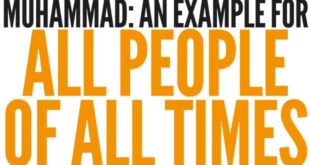A person’s rank and significance in society should be measured not by his or her wealth, a sum of money in a bank account, a family name, ancestry, beauty, or race, but by the extent of knowledge he or she has strived to attain. Truly, knowledge is the most sought after prize one can ever achieve.
The Prophet Muhammad (peace be upon him) placed greatest emphasis on learning the Qur’an and jurisprudence.
He said, “If Allah wants to favor someone, He grants him comprehension (understanding) of this religion.”
Not only studying the religious sciences is encouraged in Islam, but also the sciences which will benefit mankind, such as medicine and health sciences, engineering, economics and Islamic finance, psychology, education and so many more branches of knowledge that can serve humanity.
Opulence, expensive attire, and a collection of material possessions was never a cause of pride, elevation of status, or competition amongst the companions of the Prophet. In Islam, the person held in highest regard, admired and respected most is the learned one, the aalim. When choosing companions for leadership roles, decision-making, and ground-breaking missions, the Prophet Muhammad (peace be upon him) always favored the knowledgeable man or woman.
Scholars, in their importance in society and rewards in the Hereafter, share such a lofty position equivalent to that granted by Allah to prophets and martyrs.
It is not enough to teach young Muslims that seeking knowledge is obligatory to every Muslim. This message alone does not produce a strong enough fervor and desire to become exceptional in academic endeavors and also understanding Islamic teachings.
As a mantra to keep you motivated in the life long process of learning, look to the sayings of the Prophet, write them down, and hang them on the walls in your office and home but most importantly, apply them!
“The superiority of the knowledgeable man over the regular worshipper in Islam is like the superiority of the full moon over the rest of the planets. And the scholars are the inheritors of the Prophets, but the Prophets did not leave behind wealth, they left behind knowledge,” the Prophet Muhammad (peace be upon him) said.
Prophet Muhammad (peace be upon him) was known to have said that the death of one scholar has a more severe negative impact on a community than the death of an entire tribe. A learned person was respected, revered, and people used to travel great distances not only to learn from them but simply to be in their company.
Each child should dream of becoming a star; not a singer or an actor, but a genuine star.
“The example of the scholars on earth is like the stars in the heavens that guide people through the darkness of land and sea,” said Prophet Muhammad (peace be upon him).
No attribute, talent, or gift is superior to knowledge and education. Ali bin Abi Talib who was famous for his wisdom said, “Knowledge is better than money because knowledge protects you whereas you protect money.
Knowledge rules over things, whereas money is ruled over. Money diminishes as you spend it, whereas spending the knowledge by teaching others increases it.”
Another great Muslim scholar, Muadh bin Jabal, described the religious knowledge by saying, “Knowledge is a comforting friend in times of loneliness, it is the best companion during travels, and it is the inner friend who speaks to you in your privacy. Knowledge is the discerning proof of what is right and what is wrong, and it is the positive force that will help you surmount the trials during comfort as well as hardships. Knowledge is your most powerful sword against your enemy, and finally, it is your most dignifying apparel in the company of your close companions.”
Sadly, the value placed on knowledge, education, and learning seems to have eluded many societies in recent years in the Eastern and even Western parts of the world. It is evident from the salaries of teachers, conditions of schools, the apathy of students, and the lack of respect they display towards their teachers these days that the exchange of knowledge is no longer as cherished and sacred as it was in early Islamic history.
Check Also
ඉස්ලාමිකයෙකු මියගිය විට ආදාහනය නොකොට මිහිදන් කරන්නේ ඇයි?
1. ආදාහනය ඉස්ලාමීය ඉගැන්වීම් අනුව අනුමත පිළිවෙතක් නොවේ. ඉස්ලාමීය පිළිවෙත වන්නේ මිහිදන් කිරීමයි. 2. මිනිස් …
 Sri lanka Muslims Web Portal Diversity and Inclusiveness
Sri lanka Muslims Web Portal Diversity and Inclusiveness



